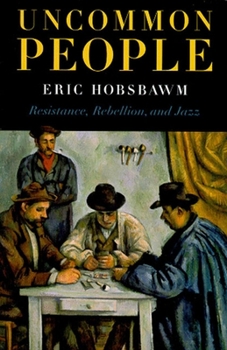Uncommon People: Resistance, Rebellion and Jazz
Select Format
Select Condition 
Book Overview
Highlighting Eric Hobsbawm's passionate concern for the lives and struggles of ordinary men and women, Uncommon People brings back into print his classic works on labor history, working people, and social protest, pairing them with more recent, previously unpublished pieces on everything from the villainy of Roy Cohen to the genius of Count Basie, Duke Ellington, and Billie Holliday. Uncommon People offers both an exciting introduction for the uninitiated as well as a broad-ranging retrospective of the work of "the best-known living historian in the world" (The Times, London).
Format:Hardcover
Language:English
ISBN:1565844661
ISBN13:9781565844667
Release Date:September 1998
Publisher:New Press
Length:360 Pages
Weight:1.57 lbs.
Dimensions:1.2" x 6.5" x 9.6"
Customer Reviews
2 ratings
Victorian Values
Published by Thriftbooks.com User , 24 years ago
The best essay in this collection is "Victorian Values", on the skilled-worker labor movement of England's 19th century.The superficial contemporary story is that British workers were lazy and bloody-minded sods who built into British industry a variety of rules which they insisted upon while their country failed in the 1970s to compete.There is some truth in this very shallow story, for by the late 1970s, it was true that many English workers had been driven crazy by the matching bloody-mindedness of the toffs in charge and their matching lack of imagination. One of Meg Thatcher's unsung accomplishments happens to be giving some of the most egregious examples of the upper class the boot.But the real story is here, in Hobsbawm's essay Victorian Values.Skilled men in Britain in the 19th century were justly proud of their status. They after all bent metal and other recalcitrant materials (in ways we no longer teach the young, allowing computers to do the job) and formed the railways which at first frightened the toffs (the Duke of Wellington himself was astonished that a thing could go so fast) and which the upper crust then took for granted.Their "Victorian Values" weren't, on Hobsbawm's account, bloody-mindedness. They were part of being sober or teetotal, industrious, church-going and caring for their families.That is: the man who thought it a natural law that he should have some of his employer's time, at the close of business, to properly care for his own tools was a man who could ask justly for this time because he also went to church and took care of his family.Contrast the post-modern scene. Employers today refuse to get lured into time-consuming debate about natural justice, whether with unions or piecemeal. Modern corporations, by encouraging personal experimentation, have liberated a lot of people, but Hobsbawm shows that perhaps conservatives are being disingenuous when they call upon working people to settle down, and return to Victorian Values.For if a man returns to the moral law the 8 hour day may again be seen to be natural, and many other work rules which are said to hamper the overarching command to be "productive."
Honest and true
Published by Thriftbooks.com User , 25 years ago
Its a very beautiful piece of work.It doesnt just follow the paces of some forgotten people, but it also paints their historic time. The chapters about the Vietnam war, the relationship between socialism and art and the one about the role of women in XIX century are brilliant. This book shows you things you wont find in a common history book.Its rich, honest and true.





